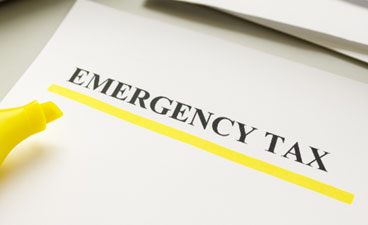-
News
-
Blog
-
Archive

Emergency tax is a temporary, higher rate of tax applied to your income when HMRC doesn't have the correct information to assign your proper tax code. It ensures you pay tax upfront—but often more than necessary. Here's why it happens, what it means, and how to rectify it, with insight especially useful for those seeking tax accountants in bolton.
Why Emergency Tax Happens
- Your tax code is used by HMRC to calculate the appropriate deductions and allowances. They assign an emergency tax code when they don't have the necessary information, like your P45, income history, or current tax code. This frequently occurs when:
- Starting a new job without a P45
- Moving from self-employment to PAYE
- Taking on multiple jobs or pension income
- Claiming benefits or allowances
Recognising Emergency Tax Codes
Look for these markers on your payslip:
- 1257 W1, 1257 M1, or 1257 X: non-cumulative emergency codes
- BR: basic-rate tax with no allowance
- OT: emergency code with no allowances applied
These codes mean you're being taxed as if each pay period stands alone, losing your full annual allowance.
Impact of Emergency Tax
Code Type |
Description |
Effect on Tax Payable |
Cumulative |
Standard code with full annual allowances |
Accurate tax calculation |
W1/M1/X (Emergency) |
No allowances considered cumulative |
Over-taxed in early payslips |
BR/OT |
No personal allowance applied |
All income taxed at full rate each pay period |
Emergency tax typically means you pay more tax now—but can later reclaim, or HMRC automatically adjusts it
Duration & Reclaiming Overpaid Tax
Normally, emergency tax remains until:
- Your new employer submits your P45
- HMRC receives updated income details and issues the correct code
- You avoid overpaying via a P800 letter or end-of-year reconciliation.
You can reclaim overpaid tax via HMRC's online Personal Tax Account or by contacting HMRC directly.
What You Can Do
- Check your payslip for emergency codes (W1, M1, BR, OT).
- Provide your P45 or fill in the starter checklist if lacking one.
- Contact HMRC or your employer to share missing details.
- Monitor your tax code updates—you should return to a standard code within weeks.
- Claim any overpayments via P800 or through your Personal Tax Account.
Why It Matters
Unexpected tax deductions can disrupt your household budget. Ensuring the right tax code is especially important for those with multiple income sources or changing employment. Many experience shocks, with over £943 average refunds issued.
For tailored guidance and to navigate complex situations, tax accountants in bolton can help ensure you're on the correct code, claim overpayments, and optimise your tax standing.
Final Thoughts
HMRC uses emergency tax as a safeguard, but it frequently leads to overpayment. Fairness and peace of mind are ensured by identifying its warning signs, updating your code, and reclaiming excess tax. When in doubt, consulting with tax accountants in Bolton offers knowledgeable assistance.